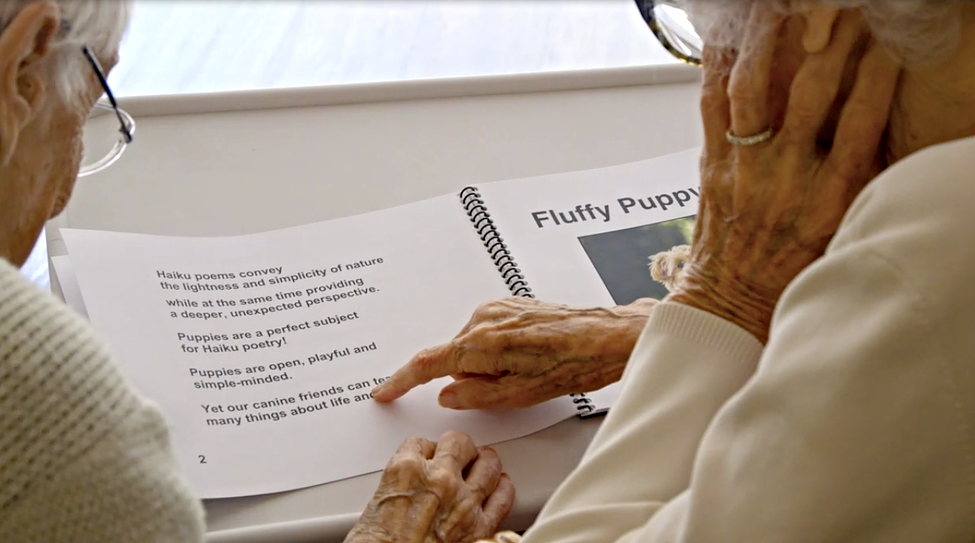Memory Cafe Directory posts and/or links to retailers can be advertising, sponsored, or affiliate links. We may earn a small commission from them. Thank you.
Books and Reading Programs for Older Adults
Reviving Minds and Voices
There are many dementia-related products on the market today; many of which are very appropriate for Memory Cafe participants. They range from medication organizers, to physical safety products and everything in between. In many cases, the benefits come to both those living with dementia along with their caregivers.
The range of products is virtually unlimited, which makes it difficult to find quality products that work well, especially ones tailored appropriately for your needs. However, there is one that is as effective as it is simple – and is perfect for Memory Cafe activities.

Courtesy Reading2Connect.com
A Good Book
But in this case, with a twist!
We all know the respite that come with a good book. The feel of the pages; the smell of the paper; the connections we make through the story, pictures, and illustrations.
Simply, we get immersed.
We are transported to another place and another time. It is our mind’s eye that paints a picture for us through the words we read. Through a good book, we are able to deeply experience that story.
Those living with dementia are no different. They can still read, and certainly are eligible for the same deeply rewarding experience. However, most conventional books aren’t right for their needs. The print is too small, the sentences are too long and convoluted, and the books have too many pages. They simply aren’t effective for individuals with memory challenges.
 Enter Reading2Connect
Enter Reading2Connect
When a speech-language pathologist and a physician get together, you know there’s going to be something very special.
Reading2Connect was founded by Susan Ostrowski, MA, MS, CCC-SLP and Peter S. Dixon, MD-FACP. They produce a wonderful series of books SPECIFICALLY for individuals living with dementia and frankly, many older individuals with cognitive impairment. This target makes Reading2Connect books perfect for Memory Cafes.
The Science
Through their clinical work, Dixon and Ostrowski encountered many older adults dismayed over their difficulty in reading. They began experimenting with the very core elements of the reading experience, like text size, language style, book layout, and the imagery used.
This research enabled them to create a collection of “easy to consume” short books and stories that have been very well received. Not only are many memory-challenged seniors enjoying reading again, some are doing so independently.
https://vimeo.com/236410113
Train the Trainer
Ostrowski and Dixon provide onsite training at retirement communities. They provide this training to address the unique needs of large group settings, ensuring each community becomes as effective as possible.
The Books
All Reading2Connect books share the same comfortable, effective traits:
- Spiral bindings to allow books to lay open flat or be folded to display just one page
- Stiff, bright white paper pages for easy manipulation and great visual contrast
- About 20 pages each and only a few simple sentences per page for easy readability
- Vibrant images for exciting engagement
- Respectful age- and ability-appropriate content, stimulating expression, laughter, and learning
Final Thoughts
The very best way to close out this review of wonderful books for those with dementia, Alzheimers, or any form of early memory loss is to share two of the Q&A entries from the Reading2Connect website:
Can people with dementia read?
Reading is a skill that is generally preserved and intact in the procedural memory of an elderly person. Like brushing teeth or using a spoon, the ability to read is automatic and often remains to some degree functional even in the later stages of dementia.
Why do older adults with memory challenges stop reading?
Despite having the retained ability to read, most people with dementia and other neurogenic conditions stop reading in the early stages of their disease. Generally their reluctance to read is not because they can’t read, but because they can’t read conventional published material. Their deficits in areas related to reading (such as ocular motor control, light perception, simultaneous processing, working memory and attention) make reading mainstream newspapers, magazines and books extremely difficult. With its low visual contrast, condensed text, extraneous visual stimuli and lengthy syntax, everyday reading material can become inaccessible.
So Valuable
There are many ways we can support those living with dementia or other forms of early memory loss. Of course, there’s the physical, financial, and emotional aspects. All are very important.
But it can be argued that none of them can compare to the sense of connection a book can make. This is a type of connection that transcends protein tangles. This type of connection immediately transports all of us – ALL OF US – to another place and another time.
This is a type of travel we all need to take from time to time.
Take a look at books and the program from Reading2Connect, scientifically developed SPECIFICALLY for those with memory challenges. Try this sampler set of six with your loved one. They are perfect tools to help deliver an immersive experience in the home or at a Memory Cafe.
You might be amazed at the connection their reading will make.




